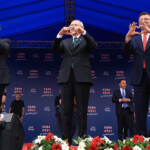‘Kılıçdaroğlu and his chief supporters repeatedly stated that they were more nationalistic to convince nationalist voters to vote against Erdoğan— but now that Erdoğan has won, all these remarks can be used by him to legitimize his own policies.’
Two important political phenomena are likely to follow the elections: the rise of Turkish nationalism and further criminalization of the pro-Kurdish political movement, and the normalization of Islamist ideology within Turkey’s legal politics. These will strengthen anti-democratic practices in Turkey and limit the possibilities for peacebuilding. As a result, ongoing policies of war in Kurdistan and the criminalization of Turkey’s pro-Kurdish political movement are likely to continue in the near future.
In the People’s Alliance, the far-right Nationalist Action Party (MHP) will have 50 MPs instead of 49 seats that they obtained in 2018. The Justice and Development Party (AKP), which today can also be classified as a far-right nationalist party, will be represented with 264 MPs once four Islamist MPs from the Free Cause Party (HÜDAPAR) return to their own party. As a result, 361 of 600 MPs will be from far-right Turkish nationalist parties, and there will be more Turkish nationalists in the parliament elected from other lists.
This is not the only reason why right-wing Turkish nationalism is on the rise in Turkish legal politics. The Ancestral Alliance, led by Ümit Özdağ’s Victory Party (ZP), received almost 2.5 percent of the total votes. They will not be represented in the parliament, since Turkey has a 7 percent electoral threshold for alliances in order to obtain parliamentary representation. That said, this is a considerable amount of votes for an ultranationalist party which has dedicated significant effort and time to criminalizing and provoking the pro-Kurdish political movement, Kurdish voters, and immigrants.
The common factor uniting all of these aforementioned nationalist political parties is a strong anti-Kurdish position. This will promote further militarization of Kurdish-populated cities, criminalization of pro-Kurdish politicians, censorship of pro-Kurdish media, and the continuation of anti-democratic practices like trustee appointments.
Moreover, this means that the interventionist policies of Erdogan’s government targeting the Kurdish populations of Iraq and Syria are supported by most voters. Thus, Turkish intervention in Iraq and Syria are likely to continue during the next few years.
There is a growing cleavage between the pro-Kurdish political movement and the rest of the opposition. The political discourses of the opposition before the second round of presidential elections lent vocal support to some of Erdoğan’s most anti-democratic policies, such as appointing trustees in Kurdish-populated cities and leading military interventions into neighboring countries.
In the end, Kılıçdaroğlu and his chief supporters repeatedly stated that they were more nationalist than Erdoğan to convince nationalist voters to vote against Erdoğan— but now that Erdoğan has won, all these remarks can be used by him to legitimize his own policies.
Contrary to the previous parliamentary terms, there will be Islamists in both camps during the upcoming years. If at least two of the Islamist parties of Nation Alliance form a joint parliamentary group (which requires at least 20 MPs), they would have the right to participate in parliamentary commissions, speak in the Parliament, and appoint representatives in some supreme councils, among other benefits.
This means that even though these three Islamist parties are not likely to represent more than 1 percent of the total votes in the country, they will have ample opportunities to shape public opinion during the next term—which will bolster the Islamist discourse of Erdogan and his government and potentially lead to more support for Islamists abroad.
***
Erdoğan is expected to continue his policies of war in all parts of Kurdistan. Five of the seven political parties with the most votes (AKP, MHP, IYIP, ZP, and YRP) already support these policies.
Even in the Nation Alliance, there were at least three political parties that were expected to politically support the militarization of Kurdistan and criminalization of the pro-Kurdish political movement before the elections:
- IYIP, a political party that has always supported the anti-Kurdish policies of the government and almost left the alliance due to the pro-Kurdish political movement’s support for its presidential candidate;
- GP, whose leader served as Prime Minister of Turkey between August 2014 and May 2016, when some Kurdish-populated cities were completely destroyed and was the supposed ‘mastermind’ behind Turkey’s pro-Islamist foreign policy in the Middle East;
- DP, a small nationalist political party known for its criminalization of pro-Kurdish MPs. These three parties will have a combined 57 seats in the parliament.
It should be noted that Erdoğan’s People’s Alliance has obtained 323 seats in the parliament, and there are two other Islamist parties in Nation Alliance which will have another 25 seats. In the end, the Parliament will overwhelmingly consist of right-wing MPs who are expected to support military intervention in Kurdish regions.
Kılıçdaroğlu’s attempts to convince nationalist voters before the second round of the presidential elections made things considerably worse. Some of his chief supporters made comments that criticized the government for its failure to make war in a more ‘efficient’ way with the pro-Kurdish groups.
Shortly before the elections, Kılıçdaroğlu implied that Salih Muslim, co-chairman of the pro-Kurdish PYD (Democratic Union Party) in Rojava, was a terrorist. On the other hand, Özdağ, who supported Kilicdaroglu in the second round, promised further military interventions into Qandil Mountains on Twitter. After reproducing such war-supporting discourses, it will be nearly impossible for CHP and its allies to criticize the future acts of war in Kurdistan.
Nearly all political actors in the country, except for the pro-Kurdish political movement and its left-wing allies, used the second round of the election to prove that they would be the most belligerent toward Kurdish groups in neighboring countries.
***
Many members of the pro-Kurdish political movement, including the former co-chairs of the HDP, have been in jail for years. Almost all pro-Kurdish mayors have been removed from their posts by the government and replaced by government officials without holding new elections.
The two weeks between the first and second rounds of the presidential elections were marked by the criminalization of the pro-Kurdish political movement from both sides—particularly accusations of terrorism. It can therefore be predicted that any pro-Kurdish mayors who succeed in the 2024 local elections will be removed from their posts, and some of the newly-elected pro-Kurdish MPs will be in jail in a few years’ time.
Discourses that accuse Kurdish politicians of being linked to terrorism will continue to be used against pro-Kurdish politics by a variety of actors, as they were before the election.
What happens next? Turkey is facing dark days. The situation will be particularly complicated for the pro-Kurdish political movement.
There is little possibility for change in the parliament, and pro-Kurdish parties are likely to lose any mayor’s offices that they may win in next year’s local elections.
Being further excluded from electoral politics, the pro-Kurdish political movement is likely to lose even more ground.
Media, academia, and civil society will be under heavy pressure in the next few years. The Kurdish diaspora and other international actors must fight against censorship and human rights violations from afar.
Anti-democratic practices will continue in Turkey. Peace will be delegitimized. Pro-war discourse will be even more common as the opposition reproduces it in order to obtain a portion of nationalist votes to secure a victory in 2024’s local elections.
Anti-intellectualism is also on the rise in Turkey. This sentiment can be seen in social media posts by public figures before and during the elections, which include claims that ‘it is no time for analysis’, mocking intellectuals for their ideas, and demonizing diaspora intellectuals.
This anti-intellectual discourse is adopted by Erdogan’s supporters and the main opposition alike. As in all cases of authoritarianism, it will continue to grow in Turkey unless political actors can transform this situation by establishing new institutions and platforms. Members of the diaspora can play an important role in this.
The pro-Kurdish political movement and the Kurdish people will face difficult days—both within and outside of Turkey. They will need significant support immediately: reports of repression are already pouring in, and the near future appears even more grim for Turkey’s Kurds.
It is true that the pro-Kurdish political movement is more than its electoral elements—and, in any case, the number of pro-Kurdish MPs will not be significantly lower than that of the last parliamentary term.
But Turkey is going down a dangerous road. International actors should prepare to respond to human rights violations, political repression, and anti-democratic actions now—not wait until the new government’s next escalation.
This is a shorter version of an article originally published by the Kurdish Peace Institute.
The views and opinions expressed above are those of the author(s) and do not reflect those of the Free Turkish Press.


